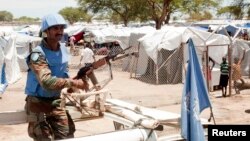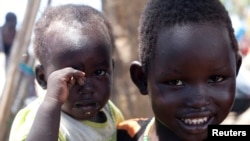UNITED NATIONS —
The U.N. Security Council voted unanimously Tuesday to refocus the U.N. peacekeeping mission in South Sudan to concentrate primarily on protecting civilians instead of nation building, and it warned those obstructing peace and reconciliation that they could face international sanctions.
UNMISS, as the mission is known, was created in 2011 to help the world's newest country achieve peace and support longer-term development. But ever since violence broke out in December, the mission has had to turn all of its attention to protecting civilians.
Now the mission officially will move away from peace-building activities to protecting civilians, aiding the delivery of humanitarian assistance, monitoring human rights and preventing renewed violence.
Formalizing actions
U.N. peacekeeping chief Hervé Ladsous told VOA the new mandate formalizes activities that the peacekeepers have been trying to carry out since the crisis erupted.
“We have been doing that since early this year, and it's confirmation that these are the priorities” until there’s a political settlement, Ladsous said. “And then of course we will have to think on the basis of that settlement what will be the longer-term tasks that will need to be redefined.”
In December, the U.N. Security Council increased UNMISS troop strength from about 7,000 to more than 12,000. Not all have arrived yet. The surge will include about 2,500 peacekeepers who will protect cease-fire monitors in South Sudan.
The resolution adopted Tuesday expresses support for cease-fire agreements signed in January and earlier this month, and calls for their “immediate and full implementation.” The Security Council also vowed to “consider all appropriate measures” against parties who undermine peace and security - a reference to the possible imposition of sanctions.
Refocus disappoints government
South Sudan’s Ambassador Francis Mading Deng told the council his government is disappointed that U.N. assistance for strengthening government capacities is no longer a part of the mandate, and hopes it will be included when the mandate comes up for an extension in November.
“The objective of capacity building is to help create a state that is capable, responsible and responsive, not a state that is oppressive,” Deng said. “Failure to help build a functioning state could lead to serious problems which the United Nations and the international community might be later called upon to help address.”
At least 1.3 million people displaced
The situation in South Sudan remains tense, with sporadic violations to the cease-fire between forces loyal to President Salva Kiir or to his former vice president, Riek Machar.
The United Nations estimated the violence has displaced more than 1.3 million people. Many have fled to neighboring countries and about 80,000 are sheltering at U.N. bases across South Sudan that are not equipped to handle such large numbers of people.
Now that the rainy season has begun, the U.N.’s department of humanitarian affairs said it has recorded nearly 600 cases of the water-borne disease cholera in the capital, Juba. Twenty-two people have died. A vaccination program is under way.
At a donors conference last week in Oslo, Norway, donors pledged more than $600 million out of the nearly $2 billion needed to fund the humanitarian response through the year’s end. The U.N. warned that 4 million people face severe food insecurity because of the fighting and their inability to plant for the next harvest.
UNMISS, as the mission is known, was created in 2011 to help the world's newest country achieve peace and support longer-term development. But ever since violence broke out in December, the mission has had to turn all of its attention to protecting civilians.
Now the mission officially will move away from peace-building activities to protecting civilians, aiding the delivery of humanitarian assistance, monitoring human rights and preventing renewed violence.
Formalizing actions
U.N. peacekeeping chief Hervé Ladsous told VOA the new mandate formalizes activities that the peacekeepers have been trying to carry out since the crisis erupted.
“We have been doing that since early this year, and it's confirmation that these are the priorities” until there’s a political settlement, Ladsous said. “And then of course we will have to think on the basis of that settlement what will be the longer-term tasks that will need to be redefined.”
In December, the U.N. Security Council increased UNMISS troop strength from about 7,000 to more than 12,000. Not all have arrived yet. The surge will include about 2,500 peacekeepers who will protect cease-fire monitors in South Sudan.
The resolution adopted Tuesday expresses support for cease-fire agreements signed in January and earlier this month, and calls for their “immediate and full implementation.” The Security Council also vowed to “consider all appropriate measures” against parties who undermine peace and security - a reference to the possible imposition of sanctions.
Refocus disappoints government
South Sudan’s Ambassador Francis Mading Deng told the council his government is disappointed that U.N. assistance for strengthening government capacities is no longer a part of the mandate, and hopes it will be included when the mandate comes up for an extension in November.
“The objective of capacity building is to help create a state that is capable, responsible and responsive, not a state that is oppressive,” Deng said. “Failure to help build a functioning state could lead to serious problems which the United Nations and the international community might be later called upon to help address.”
At least 1.3 million people displaced
The situation in South Sudan remains tense, with sporadic violations to the cease-fire between forces loyal to President Salva Kiir or to his former vice president, Riek Machar.
The United Nations estimated the violence has displaced more than 1.3 million people. Many have fled to neighboring countries and about 80,000 are sheltering at U.N. bases across South Sudan that are not equipped to handle such large numbers of people.
Now that the rainy season has begun, the U.N.’s department of humanitarian affairs said it has recorded nearly 600 cases of the water-borne disease cholera in the capital, Juba. Twenty-two people have died. A vaccination program is under way.
At a donors conference last week in Oslo, Norway, donors pledged more than $600 million out of the nearly $2 billion needed to fund the humanitarian response through the year’s end. The U.N. warned that 4 million people face severe food insecurity because of the fighting and their inability to plant for the next harvest.





